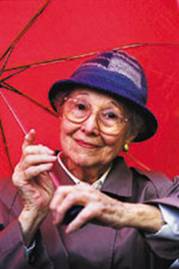|
|
Women Outlive Men, Should Plan Accordingly
By Liz Taylor, The Seattle Times
August 1, 2005

If aging had a face, it would wear lipstick. Although men get old, women get older.
The average man born in the 1920s lived to age 56, a woman to age 60. Today, the average man lives to 74, the average woman to 80. By 2030, it's expected to be 78 and 84, respectively.
As the boomers grow older, expect more of the same: Statistically, women will outlive men.
In 2030, 745,000 men in our state will be 65 and older, as will 905,000 women. Of those 85 and older, 73,000 will be male and 127,000 female.
These numbers affect us all, male and female. This became clear at a recent panel discussion called, "Women & Aging: Ethical Implications for 2005 and Beyond," hosted by the Women's Bioethics Project, a new, nonprofit think tank headquartered in Seattle, and by SAGE Crossroads, an online forum for aging research.
"Women will be living life at later ages in a way which men will not," said Dan Perry, the executive director of the Alliance for Aging Research in Washington, D.C., who opened the program. "This (boomer) generation of women redefined gender roles, gave new meaning to childbirth and family development, and will now be the first to experience longer, healthier and more vibrant lives" than any other time in history. What will this mean?
Four distinguished guests spoke, echoing similar themes.
Patricia Kuszler, an attorney, physician and dean at the University of Washington School of Law, talked about the serious financial troubles Medicare is in.
Since Medicare pays only about half of most older people's health costs, women tend to spend their savings on their husbands' care, then live alone for 15 to 20 years with far fewer resources.
Women pay a second price as primary caregiver, said Nancy Hooyman, former dean at the UW School of Social Work. It's a responsibility that is highly devalued but essential, first caring for their children, then their parents, often for their husband's parents, and then for their spouses.
In fact, so many women are caring for both children and elders at the same time, they've been dubbed the "sandwich generation." And now there's the "club sandwich" - women caring for grandchildren.
Women are the main caregivers in long-term-care settings, such as nurses' aids and chore workers. Often for young women of color who are immigrants, their low pay means they'll be impoverished in old age themselves.
Social status, for example, is an important predictor of mortality and morbidity. We know that a lack of education places an older woman at higher risk for health and social problems, and an inability to interact effectively with bureaucracies, institutions and health practitioners. It's called, "quadruple jeopardy" - the simultaneous effects of being old, female, minority and poor.
Of the 35 million Americans 65 years or older today, said Artee Young, an attorney and professor at The Evergreen State College, three of five are women, and one of every six older women is African American, Hispanic, Native American or Asian.
By 2030, one in four older Americans, regardless of gender, will be a person of color. As America grows older, it also becomes more diverse, and color, class and gender will compound the problems of this diverse older population.
Helene Starks, an assistant professor at the UW School of Medicine, said we plan better for our deaths than we do for our decline - the last 10 to 15 years of our lives.
Although we'll probably live longer and healthier than in the past, we women should assume that most of us in old age will be single, live alone, won't have much money and will have health needs to deal with. An expected shortage of family and paid caregivers means we need to start creating "communities of care" for ourselves in ways that haven't been tried before.
Says Kathryn Hinsch, founder of the Women's Bioethics Project, "Ethics is our obligation to others. Once we understand how differently men and women experience old age, we need to take it seriously - and plan for it."
|
|



